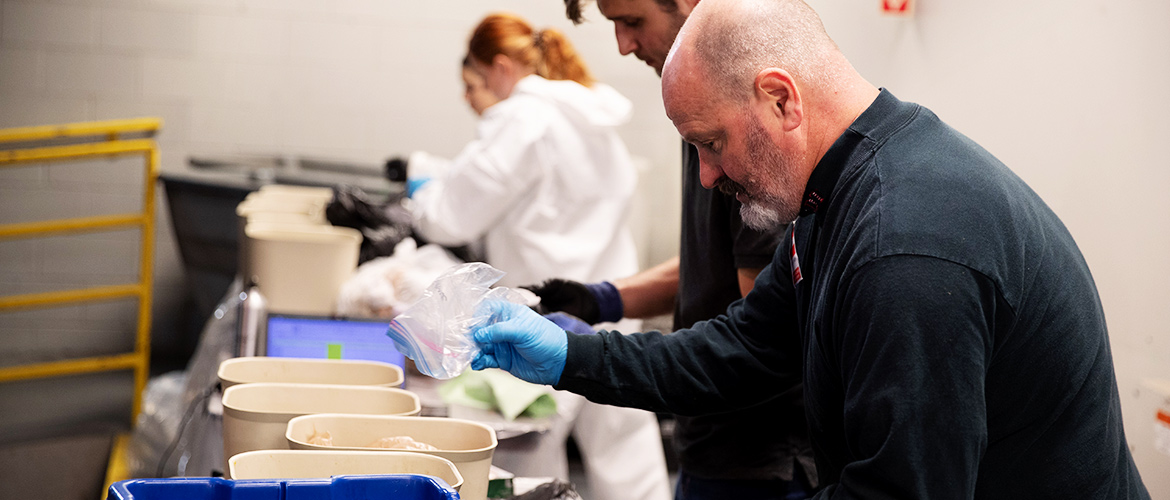Sustainability initiatives across Health Care Service Corporation are reducing landfill waste and empowering employees to prevent compostable items and recyclables from going in the trash.
Of the 3,400 pounds of waste generated daily across all HCSC headquarter buildings, up to 32% is properly diverted from landfills through recycling and composting, depending on location. For comparison, about 32% of the 292 million tons of trash generated in the U.S. is sorted to recycling and composting sites, according to data from the Environmental Protection Agency.
To further boost recycling rates and reduce waste buildup in landfills, HCSC recently conducted waste audits at its five health plan headquarters. The results provide a “temperature check” on what's working well and what can be improved, says Amy Amaon, HCSC sustainability manager.
“We’re always looking for actionable ways to bring employees into the sustainability conversation,” says Amaon, who helped oversee the audits. “Waste is an impactful part of that conversation and something we can influence.”
“HCSC’s headquarter offices are doing many things well,” says Roy Weedman, JLL senior zero waste & recycling programs manager who oversaw all five building audits. “Employees are actively reducing waste and utilize recycling and composting where available,” he says.
For example, in Montana, back of house composting goes directly to two employees with off-site farms where it’s used to feed animals and support gardens. And as of Jan. 2, all HCSC cafés started replacing single-use plastics such as utensils and beverage bottles with recyclable or compostable alternatives.
The five audits were a collaboration between JLL, HCSC janitorial staff, food and conference staff, and facilities operations to have waste bags collected during normal business operations one day before their scheduled audit.
Twelve auditors across the health plans sorted through a day’s worth of trash at each building, noting if items were disposed of correctly. Auditors also assessed building waste practices and policies.
Reducing the amount of food waste that goes to landfills — instead of composted and turned into soil for gardens and urban agriculture — remains a challenge, Weedman says.
Solid waste in landfills produces methane gas, which has more than 80 times the warming power of carbon dioxide. Over time, this alters the climate and impacts chronic conditions such as asthma, heart disease, bronchitis and other respiratory problems. An estimated 58% of methane emissions are associated with landfilled food waste, and more than 50% of HCSC’s annual waste falls into this category.
The headquarters for HCSC’s Tulsa division is contracted with a waste hauler that converts the methane gas from its landfill into electricity that powers 25,000 homes in Osage County.
The Tulsa office is also adding a recycling drop-off container to better sort plastics and other recyclables. Trash containers are being centralized and updated with color-coded recycling containers on every floor, including color-coded bin liners to help the janitorial team ensure waste is properly sorted and goes to the proper places.
HCSC is investigating commercial composting at sites where it’s available, working with existing waste haulers to improve practices and optimize current recycling programs across the company. At the employee-level, the company is planning an education campaign, interactive on-site activities, new signage at trash cans, and virtual trainings and resources.
With these and other changes, Amaon believes headquarter buildings can make significant strides in reducing food waste and recycling in landfills.
“Reducing our organizational waste footprint will positively impact those environmental social determinant of health factors that affect the health of our neighborhoods,” she says. “That’s at the core of what we do.”

